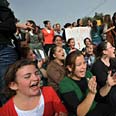
Threat to our democracy
Unwarranted Jewish home demolitions symbolize our failure as a democracy
Six months ago, 11 ministers approved a decision by Prime Minister Netanyahu to halt construction starts in Judea and Samaria for 10 months. The "freeze" applied only to buildings that had not begun.
"…this suspension will not affect the construction already underway. It will not include schools, kindergartens, synagogues and public buildings necessary for the continuation of normal life over the period of the suspension,” the Prime Minister’s Office said.
Defense Minister Barak apparently interpreted this administrative decision differently, directing the Civil Administration in Judea and Samaria to destroy buildings which have permits and were begun before the freeze was announced -- a clear conflict with fundamental civil and humanitarian law, as well as the freeze order itself.
Where Jews can and cannot build in Judea and Samaria is not easily defined, since national as well as local authorities are involved, although final decision-making is the hands of the Israeli military administration. This complicated puzzle played out last week in Ganei Modiin, home to 250 families. Although access to Ganei Modiin is through Hashmonaim, with 540 families, the two communities, under the authority of the Binyamin Council, are distinct.
Hashmonaim (also known unofficially as Ramat Modiim), half of whose residents are English-speaking, is only a few kilometers beyond the Armistice Lines of 1949. Ganei Modiin is part of Modiin Illit (Kyriat Sefer), with over 30,000 residents, among a thriving, bustling group of Jewish communities in the Modiin Valley area, in which 150,000 Jews live - not an isolated, insignificant enclave.
Driving through Hashmonaim, at the end of the road, three giant "buggers" (heavy-duty wreckers) were destroying a large, nearly completed home. Onlookers perched in other half-built homes nearby. The police had already finished destroying one home earlier that morning. The owner of that home, who lives in Ashkelon, heard of the destruction, and raced to the site with papers showing that he had permission to build, but the police and wrecking crew refused to stop.
Small groups of teenage boys from schools in the community were scattered around the site, talking with scores of border policemen and riot police. It was 11 am and the wrecking crews had taken a break. A few kids tried to get into the half-crushed building, and were dragged out. Earlier, the family that owned the building had tried this, but was quickly removed.
Deep social wounds
Channels 2 and 10 and a few reporters roamed around; a policeman and several local residents had video cameras. Several boys were arrested after scuffling with policemen as the wrecking crews resumed their work. The attorney for the owner of the house arrived, and, against the backdrop of walls caving in, dust swirling in the dry heat, the homeowner, his voice reeking with pain, explained to camera crews that he had permission to build, and had begun building before the "freeze" was announced.
That would seem to be according to law, but Defense Minister Ehud Barak and the Civil/Military Administration apparently apply the "freeze" to ongoing work as well.
The "freeze" and the destruction in places like Ganei Modiin is a disturbing symbol of Israel's failure as a democracy and as a Zionist movement. Across the hills of Judea and Samaria, a struggle is taking place, not only between Israelis and Arabs, who claim this as their land, but between Israelis representing two different cultures – one secular, the other, religious, a confrontation that sometimes gets raw, leaving deep social wounds.
Moreover, there are a number of disturbing questions: Since the "freeze" only applies to Jews, is the government acting arbitrarily and discriminatory? Is the "rule-of-law" applied selectively? Why are Jewish homes destroyed, while illegal Arab-owned homes remain untouched? How can the property of Israeli citizens be destroyed without a civilian court order, and without an opportunity to appeal to a civilian court?
In November, PM Netanyahu said: "We will not put any restrictions on building in our sovereign capital," yet, he recently declared a two-year halt to building in Ramat Shlomo.
A Supreme Court panel composed of settlement foes Dorit Beinish and Ayala Procaccia, and newly appointed Neil Hendel, confirmed the government's right to carry out its decisions. Were the judges politically motivated? Moreover, their decision did not consider if the enforcement violated the conditions and restrictions set forth by the government, nor the violation of basic civil and humanitarian law, norms and standards in democratic countries.
For example, there is no requirement that buildings be destroyed; owners can be fined, as often happens throughout Israel. And, as citizens, they are certainly entitled to the full protection of their basic rights.
Such actions by the government beg a more fundamental question: Why are such areas, with extensive Jewish populations, still under military, rather than civilian authority?
It's been 43 years! "If not now, when?"
The author is a writer and journalist living in Jerusalem










